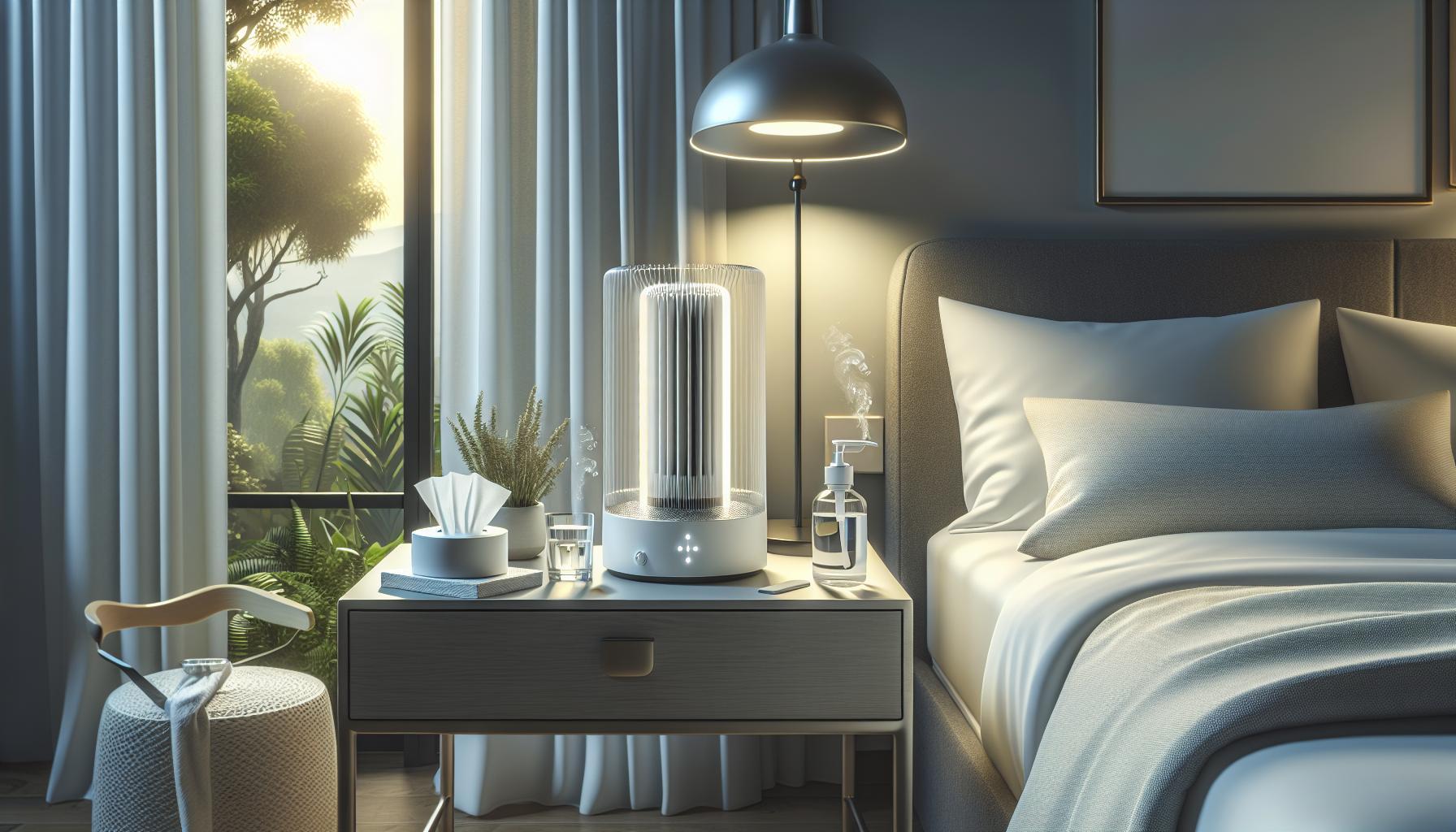Many people experience fatigue as a result of allergies, though it’s an often-overlooked concern. Allergic reactions can trigger inflammation and irritation in the body, leading to symptoms such as drowsiness and decreased energy levels. If you’ve ever felt unusually tired during allergy season, you’re not alone. Understanding the connection between your allergies and your energy can empower you to take control of your health and daily life.
As you navigate the challenges of managing allergies, it’s vital to know how to stay energized despite the odds. This article delves into the ways allergies can contribute to sleepiness and offers practical tips for combating fatigue. By implementing effective strategies and understanding your body’s reactions, you can reclaim your vitality and enjoy life to its fullest. Curious to learn more? Read on to discover how to stay energized even when allergies strike.
Can Allergies Really Make You Sleepy?
Experiencing unexpected fatigue can be frustrating, especially when allergies are the hidden culprit. While many people associate allergies with symptoms like sneezing and itchy eyes, it’s essential to recognize that they can also significantly impact your energy levels. Allergies trigger the immune system’s response, releasing histamines that can lead to increased drowsiness and lethargy. This response can sometimes mimic the effects of feeling tired from a lack of sleep, making it crucial to understand how these reactions lead to that sleepy feeling.
A common explanation lies in how allergies affect the body’s overall functioning. When your immune system is busy battling allergens, such as pollen or pet dander, it demands energy and can divert it away from your usual activities. Furthermore, allergic reactions can lead to disrupted sleep patterns, especially if symptoms like nasal congestion and respiratory issues persist at night. This cycle of disrupted rest and immune response can create a loop of fatigue that many find challenging to break.
To mitigate allergy-related sleepiness, consider the following actionable steps:
- Maintain a clean living environment: Regularly dust and vacuum to minimize allergens.
- Identify triggers: Keep a diary of your symptoms and any potential allergens to better understand your triggers.
- Stay hydrated: Drink plenty of water to keep your body functioning optimally and help ease allergy symptoms.
- Consult with an allergist: If symptoms persist, professional evaluation can lead to effective treatment options tailored specifically to your situation.
Understanding the link between allergies and fatigue empowers individuals to take control of their health. By recognizing that your tiredness might be linked to allergies rather than simply a lack of sleep, you can implement strategies that enhance your energy levels and overall quality of life.
Understanding the Science Behind Allergies and Fatigue
The complex interplay between allergies and fatigue is often underestimated. When the immune system encounters an allergen-be it pollen, mold, pet dander, or dust mites-it mounts a defense, mobilizing antibodies and releasing chemicals such as histamines. This immune response is essential for protecting the body, but it also comes at a cost: it can lead to feelings of tiredness and lethargy. Research indicates that histamines, released during allergic reactions, can directly induce drowsiness and fatigue as the body diverts energy to fight off perceived threats.
Moreover, the impact of allergies on sleep quality cannot be overstated. Individuals suffering from allergic rhinitis or other allergy-related conditions may experience nighttime symptoms like nasal congestion, sneezing, and itchy eyes that disrupt sleep. These interruptions can prevent individuals from reaching the deeper, restorative stages of sleep, leading to a cumulative effect of daytime drowsiness. For instance, a person who struggles to sleep well due to nasal congestion may find themselves struggling to focus or feeling unusually tired in the afternoon.
To break this cycle of fatigue caused by allergies, several steps can be taken. Maintaining a clean living environment is crucial; regular cleaning routines can minimize allergen exposure. Additionally, individuals should actively identify and avoid known triggers, potentially using a diary to track symptoms in relation to allergen exposure. Staying hydrated and maintaining a balanced diet rich in anti-inflammatory foods can also support the immune system’s efforts and overall energy levels. If fatigue persists despite these measures, consulting a healthcare professional or allergist can provide tailored treatment options, allowing individuals to reclaim their energy and improve their quality of life.
In summary, understanding the scientific basis behind allergy-induced fatigue highlights the importance of both management strategies and lifestyle adjustments. Recognizing that seasonal or environmental allergies can sap energy helps individuals take proactive steps to combat fatigue, fostering a more energized and vibrant life.
Common Allergies Linked to Increased Sleepiness
Experiencing an overwhelming sense of fatigue during allergy season is not just a coincidence; it’s a common reality for many individuals affected by specific allergens. Allergies to substances such as pollen, mold, pet dander, and dust mites can trigger an immune response that drains energy and leads to persistent sleepiness. This fatigue is often exacerbated by the very nature of these allergens and how they interact within the body, particularly through the release of histamines that can directly impact one’s alertness and overall energy levels.
Among the most prevalent allergens causing increased sleepiness are:
Pollen Allergies
Spring and fall bring seasonal pollen allergies, commonly known as hay fever or allergic rhinitis. During these seasons, tree, grass, and weed pollens can lead to symptoms such as sneezing, nasal congestion, and itchy eyes. As the body fights off these perceived threats, fatigue often follows, as the immune system works overtime.
Dust Mites
Dust mites are microscopic creatures that thrive in indoor environments, often found in bedding, carpets, and upholstery. Individuals sensitive to dust mite allergens may experience chronic rhinitis symptoms that disrupt sleep patterns, leading to fatigue during the day. The constant battle against these common household allergens can make staying alert a significant challenge.
Pet Dander
For those who are allergic to pets, exposure to dander can trigger an immune response characterized by sneezing, runny noses, and itchy, watery eyes. The focus on combating these symptoms can sap energy reserves, making it difficult to maintain productivity throughout the day.
Mold Allergies
Mold spores can be prevalent in damp areas of the home and the environment, especially during humid weather. Mold allergies can induce symptoms similar to those of pollen allergies, leading to respiratory issues that impact sleep quality and overall energy levels.
To manage allergy-related fatigue, it’s essential to identify and minimize exposure to these allergens whenever possible. Consider implementing the following strategies:
- Regular Cleaning: Vacuum and dust home interiors frequently to reduce allergens.
- Air Filters: Utilize HEPA filters in air conditioning units to trap pollen and dander.
- Allergy Medication: Consult a healthcare provider for appropriate antihistamines or nasal sprays that can alleviate symptoms and improve energy levels.
- Tracking Symptoms: Keep a diary of exposure and fatigue levels to identify patterns and potential triggers.
Recognizing the specific allergens that contribute to feelings of drowsiness empowers individuals to take control of their symptoms and enhance their energy throughout the day. By addressing these common allergens effectively, it becomes possible to reduce fatigue and promote a more vibrant, energetic lifestyle.
How Allergies Disrupt Sleep Quality and Duration
Allergies can silently sabotage your sleep, leaving you feeling drained and lethargic even after a full night’s rest. When allergens, such as pollen, dust mites, or pet dander, enter your body, your immune system kicks into high gear, producing antibodies to combat these perceived threats. This immune response often involves the release of histamines, chemicals that cause inflammation and congestion, leading to difficulty sleeping comfortably. Consider this: individuals with allergic rhinitis may experience sleep disruptions similar to those faced by patients with chronic insomnia, illustrating just how profound the impact of allergies can be on sleep quality.
The Impact on Sleep Quality
For many, the struggle with allergies doesn’t end when the day does. Nasal congestion, sneezing, and itchy eyes can keep individuals tossing and turning. When the nasal passages are inflamed and blocked, it becomes challenging to breathe freely during sleep. This often leads to a disrupted sleep cycle, resulting in a condition called obstructive sleep apnea, where breathing stops temporarily during sleep. Those who suffer from allergies may find themselves waking frequently throughout the night, leading to a lighter, less restorative sleep and increasing feelings of daytime fatigue.
Decreased Sleep Duration
In addition to affecting the quality of sleep, allergies can also reduce overall sleep duration. When allergens invade your sleeping environment-late-night pollen drifts, pet dander from your beloved furry friend, or even indoor mold-your body can remain in a state of alertness. This unpredictability robs you of crucial REM sleep-the restorative phase of sleep needed for cognitive function and energy replenishment. Research indicates that insufficient REM sleep can lead to a host of problems, including difficulty concentrating and increased irritability throughout the day.
To combat these sleep disturbances:
- Create an Allergen-Free Sanctuary: Keep windows closed during high pollen seasons and use HEPA filters in your bedroom to minimize dust and dander.
- Establish a Sleep Routine: Go to bed and wake up at the same time every day to enhance your body’s natural sleep cycle.
- Consider Allergy Medications: Antihistamines or nasal decongestants taken before bedtime may reduce symptoms, allowing for better sleep quality. Consult your healthcare provider for tailored advice.
- Invest in Hypoallergenic Bedding: Use dust mite-proof covers for your pillows and mattresses to reduce allergen exposure while you sleep.
Recognizing and addressing the impact of allergies on sleep is not just about managing symptoms; it’s about reclaiming your health and well-being. By implementing proactive measures to improve your sleep environment and seeking appropriate medical guidance, you can combat allergy-related sleep issues and enhance your overall energy during the day.
Recognizing Symptoms: Allergies vs. Sleep Disorders
Determining whether your fatigue stems from allergies or a sleep disorder can be complex, but understanding the distinct symptoms of each can empower you to identify the root cause. Seasonal allergies can lead to chronic fatigue, but so can sleep disorders like insomnia or sleep apnea. Allergies often present with specific physical symptoms such as sneezing, nasal congestion, and itchy, watery eyes, which may not be present in sleep disorders. If you find that fatigue is paired with these allergy symptoms, it’s likely that allergens are interfering with your sleep quality, making you feel tired during the day.
On the other hand, sleep disorders might manifest primarily as difficulty in falling or staying asleep, waking up frequently during the night without obvious external irritants, or feeling unrefreshed after a full night of sleep. Some common signs of sleep disturbances include snoring, gasping or choking sensations during sleep, and chronic difficulty concentrating which can be more pronounced without the presence of additional allergy symptoms. Understanding these differences is crucial; for example, a person with untreated sleep apnea may not experience noticeable allergy symptoms but still feel profoundly fatigued due to disrupted sleep patterns.
While it can be tempting to dismiss fatigue as a mere consequence of allergies, it’s essential to recognize when to seek professional help. Keeping a sleep diary can aid in tracking your nightly patterns, helping to distinguish between allergy symptoms and those suggesting a sleep disorder. Documenting when you feel most fatigued, any noticeable patterns, and your symptom severity can also facilitate discussions with a healthcare provider.
Ultimately, effectively addressing fatigue involves not only treating allergies but also considering your overall sleep hygiene. If you suspect that both allergies and a sleep disorder play a role in your fatigue, consult with an allergist or a sleep specialist for a comprehensive evaluation and tailored treatment plan. This dual approach can be instrumental in improving not just your sleep but your overall quality of life.
Natural Remedies to Combat Allergy-Related Fatigue
Experiencing fatigue due to allergies can feel like an uphill battle, but natural remedies can play a significant role in alleviating that tiredness and helping you stay energized. Start by ensuring that your environment is as allergen-free as possible; this may include using air purifiers to filter out pollen and dust mites, regularly cleaning your living space, and keeping windows closed during high pollen seasons. This proactive approach not only helps reduce allergy symptoms but also contributes to better sleep quality.
Incorporate herbal teas and supplements known for their anti-inflammatory properties. For example, ginger tea can alleviate sinus irritation, while chamomile tea promotes relaxation. Additionally, consider the benefits of local honey; consuming honey produced in your area may help your body build a tolerance to local pollen. For a quick boost, hydration is crucial; ensuring adequate water intake throughout the day can help reduce feelings of fatigue and maintain optimal energy levels.
Physical activity, tailored to your energy level, can also mitigate allergy-related fatigue. Short walks or gentle yoga can enhance circulation and promote the release of endorphins, improving mood and energy without overwhelming your system. Pairing this with mindfulness practices, such as deep breathing or meditation, can further reduce stress, which often exacerbates allergy symptoms and fatigue.
For those who find that their fatigue lingers despite these natural solutions, maintaining a balanced diet rich in vitamins C and E, omega-3 fatty acids, and other antioxidants can also support your immune system and help your body cope better with allergens. Whole grains, fresh fruits, and vegetables should be your staples. Engaging with nutrition can transform your health journey and play a critical role in combatting allergy fatigue effectively.
Lifestyle Changes to Maintain Energy Levels
Maintaining high energy levels while battling allergies requires a strategic blend of lifestyle adjustments and mindful choices. When allergies kick in, it’s not just your immune system at work; your body often feels the effects of fatigue, which can impact daily functioning. An effective way to combat this is by creating a supportive environment and adopting daily routines that bolster your resilience against allergens.
Start with your home atmosphere. Regularly ventilating your living space can help, but during peak allergy seasons, it’s better to keep windows closed. Invest in high-efficiency particulate air (HEPA) filters that can capture airborne allergens. Additionally, maintaining a consistent cleaning schedule can prevent dust, mold, and pet dander from accumulating. Consider using a damp cloth instead of a dry one to clean surfaces, as this method helps trap allergens instead of dispersing them into the air.
Another essential lifestyle change is establishing a sleep routine that prioritizes restorative rest. Aim for 7-9 hours of quality sleep by adhering to a consistent bedtime and wake-up schedule. Dimming lights and shutting down electronics an hour before sleep can enhance melatonin production, improving your sleep quality. Furthermore, incorporating relaxation techniques such as reading or meditating before bedtime can help alleviate stress and enhance overall well-being.
To further support your energy levels throughout the day, focus on hydration and nutrition. Drink plenty of water to keep your body hydrated, which is vital in countering fatigue caused by allergies. A well-balanced diet rich in fruits, vegetables, whole grains, and lean proteins can provide the necessary nutrients that support your immune function. Foods rich in omega-3 fatty acids, such as salmon and walnuts, can also combat inflammation, potentially easing your allergy symptoms and helping maintain your energy levels.
Finally, physical activity cannot be underestimated. Even light exercises, such as walking or stretching, can stimulate circulation and boost your energy levels. Incorporating short bouts of movement into your daily routine, like a quick stretch during work breaks or a short walk outside, can invigorate your body while providing a mental break. These small lifestyle changes can collectively empower you to fight allergy-induced fatigue, ensuring that you remain vibrant and energized despite your challenges.
Effective Over-the-Counter Solutions for Allergy Relief
While allergies may be a source of considerable frustration, fortunately, a variety of over-the-counter (OTC) solutions can help alleviate symptoms, including those that contribute to daytime fatigue. Many allergy sufferers experience drowsiness not only due to the intensity of their symptoms but also as a side effect of some OTC medications. Understanding which remedies can provide relief without causing excessive sleepiness is crucial for maintaining energy levels throughout the day.
Antihistamines
Antihistamines are often the first line of defense against allergy symptoms. They work by blocking the action of histamine, a substance in the body that triggers allergic reactions. However, it’s essential to choose the right type. First-generation antihistamines, such as diphenhydramine (Benadryl), can effectively relieve symptoms but often lead to drowsiness. In contrast, newer second-generation antihistamines like loratadine (Claritin) and cetirizine (Zyrtec) are less likely to cause sedation, allowing you to tackle allergy symptoms while staying alert. Consider trialing a second-generation antihistamine to see how it affects your energy levels.
Decongestants
Decongestants, like pseudoephedrine (Sudafed), are another class of OTC medications that can provide swift relief from nasal congestion, allowing for improved breathing and potentially better sleep quality at night. By clearing nasal passages, these medications can alleviate sleep disruption caused by postnasal drip or sinus pressure. Note that decongestants can increase blood pressure and may cause insomnia in some people, so they should be used with caution, particularly if you have existing health issues.
Combination Products
For those who experience multiple allergy symptoms, combination products that combine an antihistamine with a decongestant can be beneficial. Common examples include claritin-D and zyrtec-D. These medications may provide comprehensive symptom relief, but users should monitor their responses closely-adjusting doses or switching products may be necessary depending on the degree of sedation experienced.
Topical Treatments and Eye Drops
Additionally, topical treatments and allergy eye drops can address localized allergy symptoms without the systemic effects of oral medications. Options like steroid nasal sprays (such as fluticasone) or artificial tears can mitigate sneezing and itching, and help maintain a clearer flow of energy, allowing you to feel more awake and engaged throughout your day.
Utilizing these OTC allergy solutions effectively can mean the difference between a day spent battling fatigue and one spent enjoying daily activities. Always consult with a healthcare provider before starting any new medication, especially if you take other medications or have underlying health conditions. By choosing the right OTC options, you can empower yourself to manage your allergies while preserving your vitality and keeping fatigue at bay.
When to Consult a Doctor About Allergies and Fatigue
Experiencing ongoing fatigue alongside allergy symptoms can significantly impact your daily life, leaving you wondering whether your allergies might be at the root of your exhaustion. While it’s common for allergies to cause discomfort and sleep disturbances, knowing when it’s time to seek medical advice can be crucial for your health. If your fatigue persists despite treating your allergy symptoms, or if you notice additional concerning symptoms, scheduling an appointment with a healthcare professional may be the necessary step toward regaining your energy and well-being.
Understanding the nuances of your symptoms is key. Consult with a doctor if you experience any of the following:
- Severe or worsening symptoms: If your allergy-related symptoms-such as nasal congestion, itchy eyes, or skin reactions-are intensifying, it might indicate a more serious allergic reaction or another underlying condition that needs attention.
- Prolonged fatigue: If you consistently feel fatigued for several weeks, it’s important to rule out other potential causes, such as sleep disorders, chronic fatigue syndrome, or other medical issues that may require intervention.
- Respiratory difficulties: Symptoms such as wheezing, shortness of breath, or tightness in your chest could signify an exacerbation of asthma or other respiratory issues that need immediate care.
- Non-allergy symptoms: If you notice symptoms like fever, night sweats, or unexplained weight loss, it’s essential to consult a healthcare provider, as these can point to other underlying health conditions.
A thoughtful approach to your symptoms includes keeping a diary of your allergy incidents and fatigue levels. Documenting when symptoms flare up and their impact on your daily activities can provide valuable insights for your healthcare provider, aiding in a more accurate diagnosis. Additionally, consider discussing any over-the-counter medications you’re taking, as they can interact or contribute to daytime drowsiness.
Ultimately, listening to your body is vital. If you feel that your allergies are compromising your quality of life, take action. A healthcare professional can help tailor an effective treatment plan, ensuring that your focus is not only on managing allergies but also on enhancing your overall energy and vitality.
The Role of Nutrition in Managing Allergy Symptoms
Nutrition plays a pivotal role in managing allergy symptoms and can serve as a powerful ally in the battle against fatigue. Certain foods can either exacerbate allergic reactions or help mitigate their impact. Eating a well-balanced diet rich in anti-inflammatory foods not only supports overall health but may also enhance your body’s ability to cope with allergens. For example, foods high in omega-3 fatty acids, such as salmon and flaxseeds, help reduce inflammation and may alleviate symptoms associated with seasonal allergies.
Fruits and vegetables bursting with antioxidants, particularly those high in vitamin C like oranges, strawberries, and bell peppers, can also bolster your immune response. They help combat oxidative stress, which can escalate when your body is fighting off allergens. Incorporating a variety of colorful produce into your meals not only promotes overall wellness but also makes it easier to identify which foods agree with you, creating a tailored approach to managing your symptoms.
To maintain energy levels while dealing with allergies, it’s essential to focus on hydration and foods that stabilize blood sugar. Whole grains, nuts, and legumes provide sustained energy and prevent the energy crashes often associated with high-sugar snacks. Drinking plenty of water also keeps mucous membranes hydrated, which can support better respiratory function, reducing allergy-related fatigue.
Finally, being mindful of food allergies is crucial. Common allergens like dairy, gluten, or certain nuts can contribute to fatigue and exacerbate allergy symptoms for some individuals. Keeping a food diary may help you identify any problematic foods and work with a healthcare professional to develop a nutrition plan that serves your unique needs. By consciously choosing what you eat, you empower yourself to take control of your health and energy levels while navigating the challenges of allergies.
Mindfulness and Stress Reduction for Allergy Relief
The connection between allergies and stress is often overlooked, yet managing this interplay can significantly enhance your overall well-being and energy levels. Stress can amplify allergic reactions and chronic fatigue, creating a cycle that can be difficult to break. Practicing mindfulness not only aids in reducing stress but can also provide relief from allergy symptoms, helping you feel more energetic. Incorporating mindfulness techniques into your daily routine enables you to focus on the present moment, which can lower stress levels and reduce the inflammation associated with allergic reactions.
Practical Mindfulness Techniques
Mindfulness can take many forms, and finding the right method for you is key. Here are some effective approaches to consider:
- Deep Breathing Exercises: Simple breathing techniques can calm the mind and reduce physical stress responses. Try inhaling deeply through your nose for a count of four, holding for four, and exhaling through your mouth for another count of four. Repeat this for several minutes, focusing solely on your breath.
- Guided Meditation: Use apps or online resources to find guided meditations tailored to allergy relief or stress reduction. Even just ten minutes a day can make a difference in your overall mood and energy levels.
- Yoga or Tai Chi: Engaging in gentle forms of exercise like yoga or Tai Chi integrates movement with mindfulness, improving both mental and physical flexibility. Both practices can help ease allergy symptoms by promoting relaxation and reducing stress-related inflammation.
Recognizing the physical symptoms of stress-such as headaches, muscle tension, and fatigue-can prompt you to implement these techniques at the first sign of allergies acting up. For instance, if pollen counts are high and you begin to feel overwhelmed, taking a moment to practice mindful breathing can help mitigate the stress, thus reducing the impact of allergens on your body.
Creating a Mindful Environment
Your surroundings can also influence your experience with allergies. Establishing a calming and organized space can further enhance your mindfulness practice and alleviate stress. Consider these strategies:
- Reduce Allergens at Home: Regular cleaning, using air purifiers, and keeping windows closed during high pollen seasons can create a more comfortable living environment.
- Incorporate Nature: Having plants indoors not only adds beauty to your space but also promotes a sense of calm. Just be sure to choose non-allergenic plants.
- Establish a Routine: Consistent sleep and self-care routines can foster a sense of stability, making it easier to manage stress and fatigue associated with allergies.
By taking these mindful steps, you’ll not only find relief from allergy symptoms but also empower yourself to combat fatigue with renewed energy. Prioritizing your mental health through mindfulness can help disrupt the cycle of stress and allergy-related exhaustion, allowing you to engage more fully in life.
Harnessing Exercise to Boost Energy and Combat Sleepiness
Engaging in regular physical activity is a powerful tool for combating sleepiness and boosting energy levels, especially for those grappling with allergies. When allergens trigger your immune response, the resulting inflammation and fatigue can significantly sap your energy. However, incorporating movement into your daily routine can help counteract these effects. Even light to moderate exercise-such as walking, yoga, or cycling-can stimulate the release of endorphins, which improve mood and enhance energy.
Moreover, physical activity improves blood circulation and can alleviate allergy symptoms by promoting better respiratory function. For instance, a brisk walk outdoors can help clear your airways and reduce nasal congestion, making it easier to breathe. The key is to balance outdoor activities with awareness of pollen counts or environmental triggers. On days when allergies are particularly active, indoor exercises like strength training or dance can be excellent alternatives to maintain your routine without exacerbating symptoms.
To make the most of exercise while managing allergy-related fatigue, consider the following tips:
- Set Realistic Goals: Start with manageable goals, such as engaging in 30 minutes of activity three to five times a week. Gradually increase intensity as your comfort level allows.
- Incorporate Stretching: Implement stretching and flexibility exercises into your routine. This not only promotes relaxation but can help alleviate tightness caused by allergic reactions.
- Join a Class or Group: Finding a community or group can provide motivation and accountability. Look for classes that resonate with your interests and accommodate your allergy considerations.
By harnessing the benefits of exercise, you empower yourself to reclaim energy and reduce the sleepiness often associated with allergies. The combination of increased physical activity and strategic management of your allergies can lead to a significant enhancement in your overall well-being, allowing you to fully engage in daily activities with vitality.
Frequently asked questions
Q: Can seasonal allergies make you feel more tired?
A: Yes, seasonal allergies can lead to increased fatigue. When your body reacts to allergens, it releases histamines, which may cause sleepiness and reduce your ability to focus. To mitigate fatigue, consider managing your allergies with medications and natural remedies found in the article’s sections on effective solutions.
Q: What are some signs that my sleepiness is caused by allergies?
A: Key signs include persistent sneezing, nasal congestion, and itchy eyes, combined with drowsiness, especially during allergy seasons. If your sleepiness coincides with these symptoms, consult the section on Recognizing Symptoms to accurately differentiate between allergies and sleep disorders.
Q: How can I boost my energy levels during allergy season?
A: To boost your energy, focus on a balanced diet, stay hydrated, and get regular exercise. Incorporate mindfulness practices and consider natural remedies. The article’s Lifestyle Changes section offers additional actionable tips for maintaining energy levels while managing allergies.
Q: What lifestyle changes can help reduce allergy-related fatigue?
A: Key changes include establishing a consistent sleep schedule, reducing indoor allergens, and engaging in regular physical activity. These adjustments can help improve your overall energy levels. Explore further in our Lifestyle Changes article section for more in-depth strategies.
Q: Why do allergies make me feel so fatigued after a night’s sleep?
A: Fatigue after sleep could result from disrupted sleep due to allergy symptoms like congestion or coughing. Poor sleep quality prevents restful sleep. Consult the section on How Allergies Disrupt Sleep Quality for effective strategies to improve your rest despite allergies.
Q: Are there specific foods that can help with allergy-related sleepiness?
A: Yes, foods rich in omega-3 fatty acids, antioxidants, and magnesium-like salmon, leafy greens, and nuts-can support your immune system and potentially alleviate allergy symptoms. Refer to The Role of Nutrition in Managing Allergy Symptoms for detailed dietary recommendations.
Q: When should I seek medical advice for allergy-related fatigue?
A: Seek medical advice if your fatigue persists despite managing your allergies or if it’s accompanied by other concerning symptoms like severe headaches or difficulty breathing. The article’s section on When to Consult a Doctor provides guidance on when to reach out to healthcare professionals.
Q: Can exercise help with allergy fatigue?
A: Yes, regular exercise can boost your energy and improve overall well-being. It helps reduce stress, which can exacerbate allergy symptoms. The article’s section on Harnessing Exercise to Boost Energy outlines specific activities to help combat sleepiness associated with allergies.
Key Takeaways
Feeling sleepy due to allergies can be a frustrating experience, but understanding the connection between your allergies and fatigue empowers you to take action. Consider integrated approaches like managing your living environment, exploring natural remedies, and consulting a healthcare professional to optimize your energy levels. Remember, you’re not alone in this battle against allergens!
For more insights, check out our articles on battling seasonal allergies and tips for improving your sleep hygiene, which can further enhance your vitality. If you found this information helpful, don’t hesitate to subscribe to our newsletter for ongoing tips and resources tailored to keep you energized and informed. Together, we can conquer allergy challenges and reclaim your zest for life!





